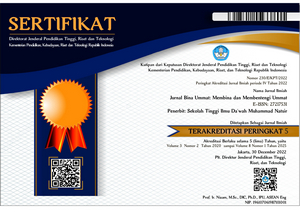THE ROLE OF DA'WAH IN OVERCOMING SOCIAL PROBLEMS
PERAN DAKWAH DALAM MENGATASI MASALAH SOSIAL
DOI:
https://doi.org/10.38214/jurnaldawahstidnatsir.v6i1.155Keywords:
The role of Da'wah, Problem, SocialAbstract
This paper aims to describe the role of da'wah in overcoming social problems as well as provide a better understanding of the importance of da'wah in that context. The method used in this writing is literature analysis, with reference to sources of religious texts, academic studies, and related research. The result of this writing is a deeper understanding of the role of da'wah in dealing with social problems, such as poverty, violence, social injustice, and global injustice. Through da'wah, Muslims can provide education, empowerment, and assistance to those who are marginalized, promote peace, tolerance, justice, and take part in efforts to build a better world. The impact of this paper is to provide new insights to readers about the importance of da'wah in dealing with social problems. It can also inspire Muslims and society in general to get involved in efforts to address social problems in their neighborhoods. In addition, this paper can be a reference for researchers, academics, and da'wah practitioners in developing more effective strategies in dealing with social problems.
Published
How to Cite
Issue
Section
Copyright (c) 2023 Jurnal Da'wah: Risalah Merintis, Da'wah Melanjutkan

This work is licensed under a Creative Commons Attribution 4.0 International License.
This work is licensed under a Lisensi Creative Commons Atribusi 4.0 Internasional.
Authors who publish with this journal agree to the following terms:
- Authors retain copyright and grant the journal right of first publication with the work simultaneously licensed under a Creative Commons Attribution License that allows others to share the work with an acknowledgment of the work's authorship and initial publication in this journal.
- Authors are able to enter into separate, additional contractual arrangements for the non-exclusive distribution of the journal's published version of the work (e.g., post it to an institutional repository or publish it in a book), with an acknowledgment of its initial publication in this journal.
- Authors are permitted and encouraged to post their work online (e.g., in institutional repositories or on their website) prior to and during the submission process, as it can lead to productive exchanges, as well as earlier and greater citation of published work (See The Effect of Open Access).




